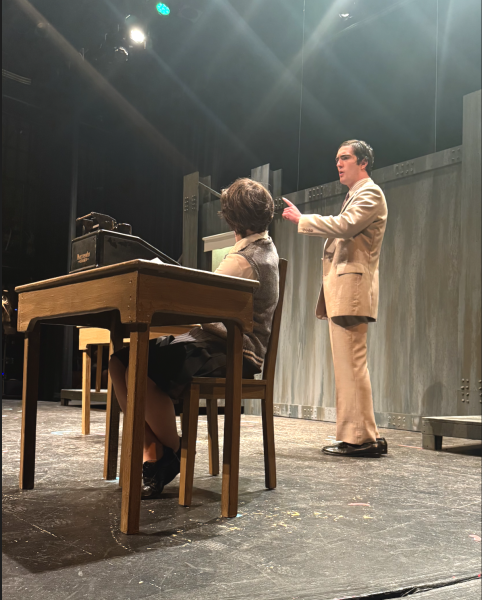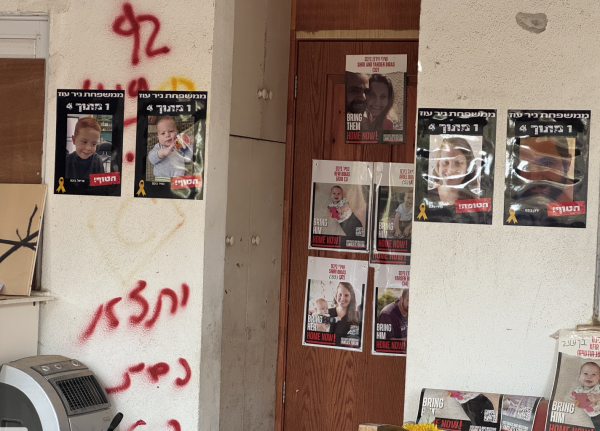Union Debate Reaches Fiery Crescendo as June 2 Date Looms Closer
May 28, 2021
With less than a week to go until the teachers cast their votes, unionization organizers continue to attempt to solicit support, while the faculty remains as divided as ever.
The June 2 vote will take place in person from 3:30 to 6:30 p.m. at the tent in Lincoln Park. The secret-ballot election will be administered by the National Labor Relations Board. In total, 185 faculty members, including assistant teachers and nurses, will be allowed to vote, and the vote will be decided by a simple majority of those who actually cast a ballot. The Latin administration could challenge whether votes from assistant teachers and nurses will be included in the tally if it turns out that those votes determine the outcome. The unionization vote will be tallied immediately on the evening of June 2.
Additionally, no mail-in votes will be allowed; faculty members unable to vote during the three-hour window will not have their votes counted.
Tensions among Latin faculty came into focus in a recent email chain. Middle School history teacher Max Rouse sent an email to all faculty and staff members “to offer an alternative to the binary choice currently before us.”
“Whether the union wins or loses, our community as a whole will lose because the process will produce only a political victory and not a resolution that will focus on issues and healing,” Mr. Rouse wrote. “The vote will merely cement the divisions between us and will further damage our culture.”
“Regardless of the outcome,” he wrote, “after the June 2nd election, one major group of our friends and colleagues will wonder whether they belong (or can exist) at Latin because of the election result. In essence, it is the vote itself that is the problem and prevents all of us from getting to the win we all desperately need.”
Mr. Rouse hopes to petition to cancel the vote on June 2 and perhaps push back the vote another six months to a year. “By gathering enough signatures, we can send our petition to the National Labor Relations Board to let them know that there is a group who wishes to cancel the election. The process would then move to the Union Organizing Committee to decide whether to cancel the vote and the school could enter a cooling off phase for up to six months. This does not suspend the Union Organizing Committee’s activities nor does it curtail its ability to ask for a vote in the future.”
Right as this article went to press, it was reported that Mr. Rouse’s petition did not receive enough signatures.
Mr. Rouse’s email was met with an immediate backlash. One Upper School English teacher, responding in an email to the entire faculty, wrote that Mr. Rouse’s argument that the vote will solidify tensions between pro-union and anti-union teachers “renders invisible the experiences of colleagues who already feel as though they do not belong. This lack of belonging predates this rather taxing year, and necessitates restructuring existing asymmetrical power relations with an eye towards furthering equity and inclusion.” This teacher said they have “yet to hear solutions other than trusting that existing structures will somehow operate differently in the future.” According to them, voting for the union on June 2 seems like the only tangible step toward making changes to DEI initiatives.
Another teacher, from the Middle School, responded, “I’m curious to hear, since you’re a history teacher, Max, how this suggestion of yours is markedly different than other types of voter suppression.”
And a teacher from the Lower School wrote, “I’m curious to hear how this suggestion of yours is not a conflict of interest considering that you will no longer be a teacher next year but an administrator who will be supervising teachers who may or may not sign this.” Mr. Rouse will become assistant head of the Middle School next year.
Union spokesperson Faye Wells responded to Mr. Rouse as well. “Telling a person their bad experience is not really all that bad, is silencing and simply unjust, and quite frankly, gas lighting,” she wrote, adding several other bullet points:
- “Equity requires sacrifice from those with power, and that is uncomfortable for those with that power.”
- “Why do you defend an administration that considers some and not others? Shouldn’t we all stand united?”
- “Think about your experience. Do you benefit from the unequal access to the people in power at this institution? What happens when those people turn over, how will you feel then?”
- “What protects you? Protocol, contract, counsel? Or admin’s word?”
- “If they say they are so benevolent, why would they take benefits away? Why are we talking about starting at 0 if you believe the admin care?”
One teacher who opposes the formation of a union wrote in the email chain: “I think what many are asking for is a conversation among the entire faculty, face to face. The manner many were asked to sign the initial agreement to sign the [union] card felt, to me, very clandestine. Why can’t we all just get together and have a conversation? As someone who has been at Latin for [many] years to learn of this movement the day before it went to press was personally hurtful.”
Upper School science teacher Steven Coberly also sent a letter this week to faculty members, co-signed by 32 colleagues and 10 additional anonymous individuals, arguing against establishing a faculty union at Latin. “Unionization is fundamentally at odds with the freedom, flexibility, and professional respect that lie at the heart of what it means to teach at an independent school,” the letter said. Additional bullet points in the Coberly letter:
- “Many members of our faculty that have actually been in teachers’ unions have had a negative experience and are opposed to forming a union at Latin.”
- “… negotiations would be about wages, benefits, and conditions of employment and would not include a promise of faculty input into administrative decisions.”
- “A union will not give us `a seat at the table.’ A collective bargaining agreement would be negotiated by a representative from the IFT, a lawyer from the union, and two or three Latin faculty members.”
- “This is the wrong time to make this decision. This has been a terrible and unusual year. We would never entertain making major changes in curriculum, pedagogy, or other key aspects of our work together in the midst of such a bizarre year. Now is not the time to even consider making such a major cultural shift in our school.”
- “For all practical purposes, we will not be able to individually opt out of a union. Each member of the faculty will be governed by the Collective Bargaining Agreement negotiated by the union, regardless of whether that person chooses to actually `join’ the union. ‘Opting out’ simply means giving up a voice/vote in decisions made by the union.”
When asked to articulate a closing argument before the vote, union spokespeople Faye Wells and Elissabeth Legendre said, “We are told that we are the heart and soul of the school, and we are forming a union to make our workplace—your school—better for everyone.”
“We see you, our students, every day, and we spend a great deal of time with you, so we understand your successes, your struggles, and your academic needs in unique ways. A union fosters a culture of mutual respect and relies on our expertise and experience to help make important decisions at Latin—decisions that affect your learning and well-being,” they said.
They noted that if they cannot solicit a simple majority on June 2, “many faculty members will be disappointed, but we will continue to do what we always do: work collaboratively, build community, teach innovatively, advocate for students, care for families, and make Latin the best place it can be.”
Head of School Randall Dunn, asked to make his closing argument prior to the vote, said, “This decision is anything but simple. It is actually the most complicated and significant thing that could happen at Latin for a long, long time.”
“My hope at this point is that everyone who is eligible to vote considers that significance when the vote comes,” Mr. Dunn said. “Our community is vulnerable and burned out from the year we have just endured. I understand the desire to want to do something drastic in response, but the divisiveness and discord created by inviting in a third party isn’t the solution. I want to work to address our issues and do it in a way that doesn’t require just a ‘simple majority’ but instead requires everyone—faculty, staff and administration—to come together and move our school forward on behalf of our students. My hope is that we can preserve our ability to do that.”
The Latin administration and some other opponents of unionization have emphasized that the school could potentially face a teacher strike if the faculty were unhappy with their work conditions. Many unions opt for a “no-strike clause,” defined as “a provision in a collective bargaining contract in which the union promises that during the life of the contract the employees will not engage in strikes, slowdowns, or other job actions. A union often agrees to such a clause in exchange for a grievance arbitration provision.”
When asked whether the union would consider adding a no-strike clause to the contract, its spokespeople responded that for now, their main focus is the June 2 election. “We want to create the best learning conditions for students, which will require good faith negotiations from the administration as well as the Union. We can’t predict how negotiations will go every time, but our goal is to collaboratively come to an agreement.”
They said there are “many reasons [they] might choose to include [a no-strike clause]” in their contract, but they declined to say definitively that they would accept a no-strike clause.
“Striking only happens when many entreaties to administrators and calls for collaboration have failed,” they said. “Rather than asking what conditions could lead to a strike, we should ask what actions from administrators would lead to such discord that faculty would even consider striking.”
Both sides have sent multiple emails in recent weeks to make their case. Earlier this week, union supporters sent a newsletter with the heading, “The Voices of Latin School Union” below five “Roman Arches.” The letter started off with a subheading, “Modeling the Best of Democracy.”
“We have tried hard to keep the tone of this discussion elevated, to avoid attacks, not to question motives. We have answered questions at length, in a wide variety of forums,” the newsletter read.
“After we vote to unionize, we will democratically form committees, elect officers, and choose a bargaining team to represent us. The bargaining team will solicit feedback while drafting a contract proposal, and LSU members will have to vote to approve a contract even after a tentative agreement is reached with administration. … Each step in our journey confirms and uplifts the value of democracy.”
They then argued that unions elsewhere have helped African-American and Latinx employees get higher wage increases than the national averages.
Following these numbers and a specific reference to the low salaries of assistant teachers at Latin, the newsletter concluded with a spotlight on a Lower School teacher, Avani Tandon. Acknowledging that she is a new member of the Latin community, she said she is “also a young woman of color,” and “the very aspects of my identity that I believe can benefit our Latin community and help it grow have become the hindrances that leave me feeling othered, inferior, and afraid to speak up.”
On April 26, an Instagram account run by the union called @latinschoolunion posted for the first time—a collection of photos gilded with different parts of the union’s logo, so that the “Latin School Union Logo” can be seen loud and clear. The seventh post, posted on May 14, said, “I support Latin School Teachers! Good luck as you work toward forming a union!” The caption said, “Show your support for Latin Teachers and the Latin School Union by sharing this post,” followed by orange and blue heart emojis.
Under this post, an Upper School sophomore wrote a comment indicating their reluctance to share the post: “No, I don’t think I will.” The union deleted the comment.
The student also commented: “If you’re opening the dialogue online to the students, and further asking them to repost on their story, I feel you have to accept the good with the bad, instead of deleting comments that don’t offer full and unwavering support. Kinda childish.”
This comment was also deleted and the student was comment-blocked.
Regarding the deleted comments, the student said, “You know at the end of the day, the union isn’t here nor there, the real problem with this censorship is silencing the voices of the people at school, and I think this is a problem in our community. The union claims to be transparent and open, yet deletes comments that don’t offer unwavering support for them. How can the union say they are for the students, but when the students speak out they’re silenced? And why do others get a voice?”
The student added, “I truly don’t think it’s fair for them to ask for support on social media, bringing this discourse to the students only to blatantly delete comments and comment-block those that oppose them.”
“This is why kids are afraid to speak up,” the student said. “Because they are ridiculed (just as I was when I commented this) and silenced. When I posted that comment I received a lot of feedback saying how they agreed with me, but were afraid to speak against the ‘majority opinion.’ Not only should kids not be silenced but we should also hold ourselves up to be as accepting as we claim.”
Another student commented on the union’s Instagram: “Are students’ comments included in the total transparency or are those ok to hide if you don’t like them?” This comment was also deleted.
Sophomore Alice Mihas, who saw the initial comment, said, “I think that the Latin School Union Instagram is slightly hypocritical for taking down student’s unsupportive comments, whereas whenever they get support, they keep it up.”
She added, “So much of the union’s messaging is that it’s better for students and it helps communication, but they’re just taking away students’ voices.”
The Instagram is then populated with colorful infographics with quotes from former students showing their enthusiasm for Latin School teachers.
On Thursday, pro-union teachers wore blue and orange ribbons to show their support for the union movement, putting divisions between teachers on full display for all—even students—to see.























































Phil Canfield • Jun 2, 2021 at 5:28 pm
Ashna- this is such a well written piece! While reading, I actually forgot it was written by a Latin student- I felt as though I was reading something in the Economist, Wall Street Journal or New York Times. Congratulations and thank you for pulling together a thoughtful, thorough analysis! Phil Canfield
Inna Elterman • May 28, 2021 at 3:01 pm
Ashna, thank you for covering all aspects of the debate. Great journalism
Carrie Parr • May 28, 2021 at 12:34 pm
Great, informative article, Ashna! Thank you.
Charlotte O’Toole • May 28, 2021 at 12:28 pm
Great article, Ashna. You have done an outstanding job covering this topic for the past few months. Reading this article, I found the hypocrisy of the union very interesting—the general student opinion around the union is something union supporters should consider, if one of the pillars of their argument is being “for the students.” Being “for the students” might actually be an anti-union position, if that is the direction that the majority of Latin students are leaning.